Ordinary Women Extraordinary Lives - Leelamony
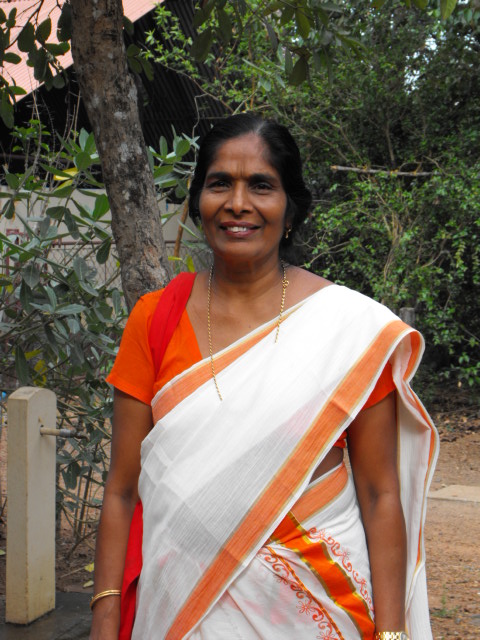
Standing tall as a woman in a conservative society, leaving her home to travel to distant shores determined to make something of herself at the tender age of 17, defying society’s norms and marrying the man she loved, empowering women to break out of rigid customs that held them to the ground teaching them to soar above prejudices and find their wings – I give you Leelamony Moozhiyil.
When I met Leelamony for the first time, she was all hustle bustle, getting us settled in our rooms at BASIS and ensuring that we had all we need. That was after she welcomed me with a big hug, inquired if I had a comfortable journey and expressed concern that I was looking tired (This is what I surmised by her heartfelt gestures); and then she paused mid breath with “Ach-so she doesn’t understand German!” She then proceeded to give me another big hug and start over in English. I fell in love with the woman right then!
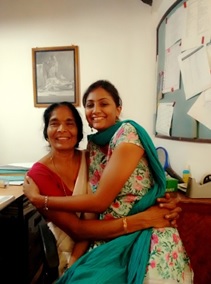
Through my stay at BASIS (the sustainability enterprise that she runs with her husband), I was quite enamored by Leelamony to be honest. As an Indian woman and having had many friends from Kerala, I can say that Leelamony is unique in many, many ways. Women in urban India have come a long way from what they were a few years ago. Strong, independent and sure of themselves, they have broken the traditional bonds that kept them down all those years. But this was different; it was deep in the heart of Kerala and this was a woman donned in the traditional mundum neriyathum (a two-piece sari) - you don’t expect her to be the bustling, enterprising partner of a resort chain and an advocate of local women in the area.
But there she was and I was intrigued. I wanted to know her story and I am sure you will enjoy it too.
Leaving the nest
Leelamony sailed to Germany to train as a nurse when she was 17. Now in this time and age, it isn’t a big deal really. But this was in the 60s and she was a young, village girl from Kerala.

She was born in Alleppey, a quaint little village in the heart of the backwaters of Kerala. Born into a Brahmin Catholic family, it was as traditional as traditional can get (I was intrigued about this one. Brahmins are a caste system rooted in the Hindu tradition, which begged a probe into what it meant that Catholics were Brahmin … here is an interesting take on Wiki: https://en.wikipedia.org/wiki/Roman_Catholic_Brahmin)
It was unusual (if not taboo) for a young woman to venture out and seek work. It isn’t that women were treated badly. In fact, Kerala was a matrilineal society until the mid-twentieth century. Under this system, known as Marumakkathayam, descent and the inheritance of property was traced through females. Even today, in many families, children carry their mother’s last name and not that of their father. Leelamony’s husband Mathew Moozhiyil, told me that the doors of traditional Kerala houses were often very low, which was to ensure that a man entering the house would have to bow low in respect to the women within.

Women held an important position in the family yes, but that position was strictly confined to the home. Leelamony disagreed. She wanted to make something of herself. “There was no scope for growth here for a woman,” she says; so when an opportunity presented itself, she grabbed it with both hands. “The priest in our church told my aunt about an opportunity for work in Germany. My parents weren’t too happy, but I thought it must be better to leave this place if I have to make something of myself!”
And so she set sail on a journey that would carry her and 3 other girls from Kerala to Germany. I can only imagine the trepidation of a 17 year old whose life had hitherto been confined to a small village in Kerala; but off she went to Cochin-Pune-Bombay-Paris-Athens- and finally Germany.
She signed up for a 3 year nursing course and lived on the premises with the other girls. “One year I spent learning German!” she says. It was difficult no doubt, but this was one determined young girl reaching for her dreams and nothing could stop her!
Falling in love
“4 years after I came to Germany, I met Mathew,” she says with a smile in her voice.
Knowing that a love marriage is still frowned upon in the conservative culture of Kerala, I asked her how her family took the news.
“They were not very happy,” she says with a faraway look. “Nowadays, society is more open to a love marriage, but back then marriages were arranged. We married in Germany, and returned. But it was very difficult when we came here. Matthew’s family were not very happy with me initially, but it became better gradually.”
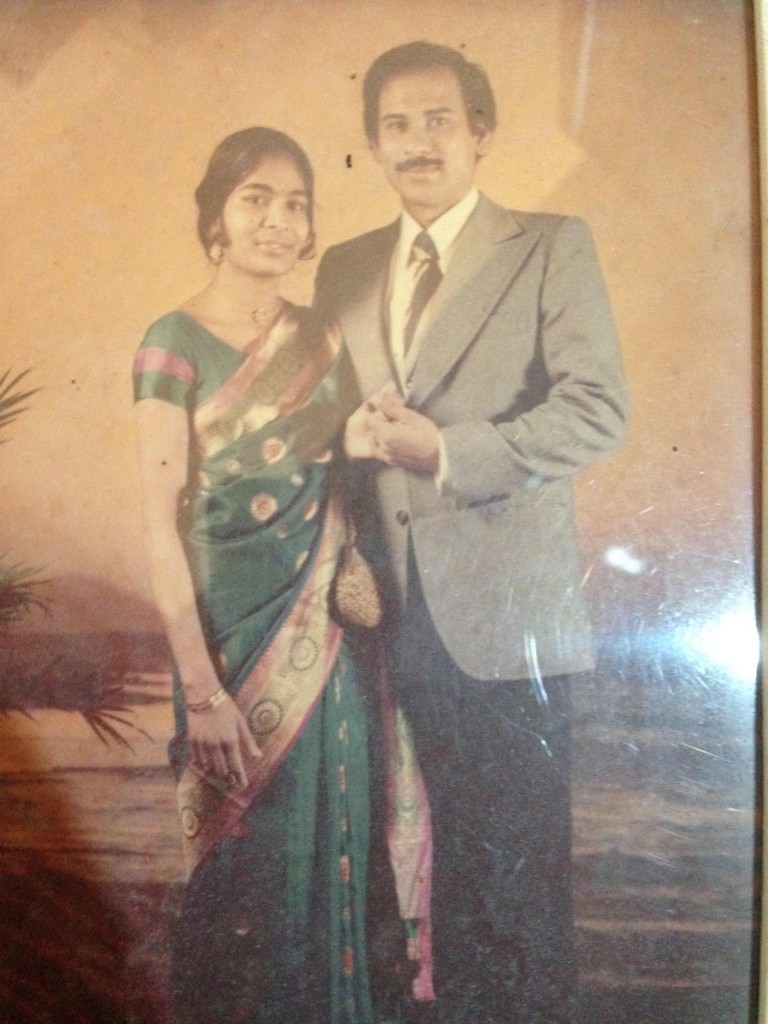
Back Home
21 years in Germany and three kids later, Leelamony and Mathew decided to come back to Kerala. “We wanted to do something for our people,” she says; and “do something” they did!
Among the many things that Leelamony and Mathew did for the people of Sreekandamangalam, which they made their base, they concentrated on bettering the lives of women and the lower castes.
“We started a number of workshops, training units and work opportunities. 18-30 year olds were given the opportunity to take part in cultural programs, cooking, and art. A lot of them were women. At one time, we had about a hundred girls and women working here,” she says with obvious pride in her voice, “Some of them found it difficult to come; their parents didn’t give them permission but I told them– we have power as a woman in the community we are equal to men, we women are not backward, that’s why we have to come forward.” I could hear steel in her voice.

They were over 18, so why were they not permitted to work there, I wondered aloud.
“The man of the family; the father, brother, or husband did not want the women of the house to go out and see the world. The women had a designated role in the family - cooking, cleaning, and taking care of the home. Not many parents wanted their girl child to be exposed to the world,” she says with a note of anger creeping in her voice.
She then explained how the women benefitted from the programs at BASIS. Through the course of their work at BASIS, local women were given the opportunity to associate with Germans, and experience a part of another world and culture from them.
I asked her more about the opportunities given to women; I wanted to know which of the units in BASIS were most women inclined towards.
“Tailoring, art and household,” she is quick to answer. “We helped them buy sewing machines and get their own tailoring units set up. We also helped nursing students with funding for their education”
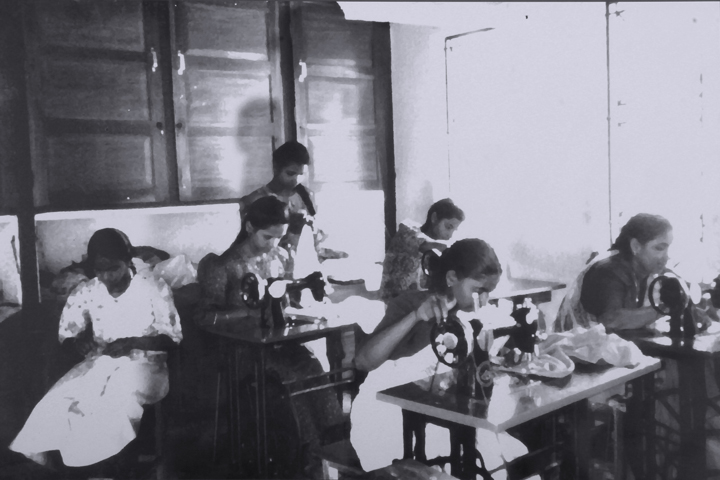
Many of the women who sprouted their wings at BASIS have started tailoring shops in their houses – small scale entrepreneurs now! Some of them work in big tailoring firms. Other women have benefited from the other little things that Leelamony and Mathew painstakingly helped them with - they were taught hygiene, setting up kitchens, and building toilets.
Was it all smooth sailing? Did she face challenges in adapting to the society here after so many years in Germany?
“Yes,” she nods, “the community here is run by man. As a woman, you are placed at the lowest strata of society. People would come to BASIS for favours, but they would completely sidestep me and ask ‘Where is Sir?’ They weren’t too happy that we were getting their girls to get out and work.”
What helped her overcome the situation here?
“We were lucky since we came from a Brahmin Christian society, which is a little higher than the other castes. They were tolerant because we were of a higher caste. They wouldn’t have allowed their children to come work with us otherwise. I kept at it; I did not back down,” she pauses for a beat and adds fondly, “My husband really helped me too. He would push me in the forefront and direct people to me. They soon stopped asking ‘Where is Sir?’ The twinkle in her eye is unmistakable.

“I want to dance!”
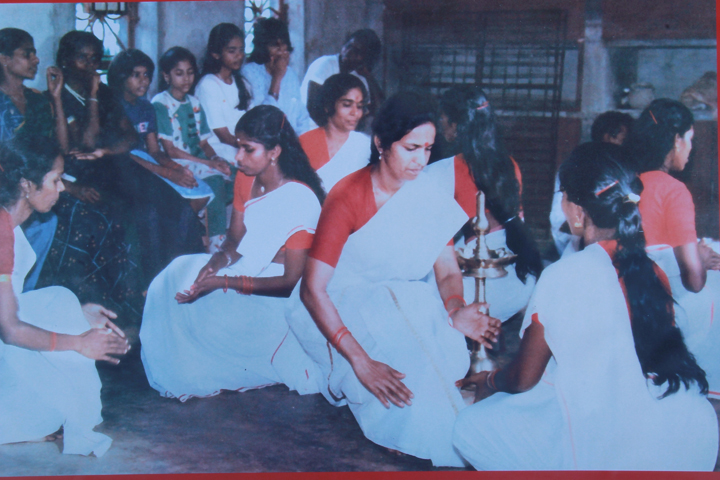
She had to face a lot of challenges changing long held societal norms.
Brahmin Christians weren’t allowed to take part in folk dances or Indian Classical dances. But “I wanted to dance!” she says expressing her indignation. Well that was enough for the determined little lady, as she gathered a few tailoring students and choreographed a dance that they decided to present in a cultural show at the Panchayat.
There was resounding opposition. “Many girls had to face a lot of opposition in their homes because of this. Men did not like it; they asked the women not to come back to BASIS as they thought we were causing them to rebel,” she shakes her head, “Many left, but a few women risked the displeasure of their men and came back.”
There is much more to Do!
I was overwhelmed with the extraordinary work that they had done for the people in Sreekandamangalam and expressed as much. “Ach-so, but there is so much more to do!” she exclaims. “Yes, it is better in Sreekandamangalam but now we have to help others, we are starting workshops in our resort in Kumily,” the evergreen, ever enterprising Leelamony Moozhiyil adds.
I ask her if she has any parting words for women here.
She sits up a little straighter as the words spill out from the depths of her heart: “Man and woman are both God’s own creation so we have the same level in society. I think man and woman belong to one another, nothing can happen with one alone; they are equally important. Only if they work together in respect will they accomplish anything.”
True that and she has lived her life helping women believe in themselves. She has nurtured that spirit of freedom and self-respect in her daughters too. One of her two daughters, Theresa Moozhiyil, has become a very dear friend and is one of the strongest women I have had the pleasure to know. Anuradha, the older daughter is raising a lovely family in Germany. She wasn’t alone in this accomplishment though; I can’t wait to write about the lovely, ebullient and positive Mathew Moozhiyil … stay tuned!

